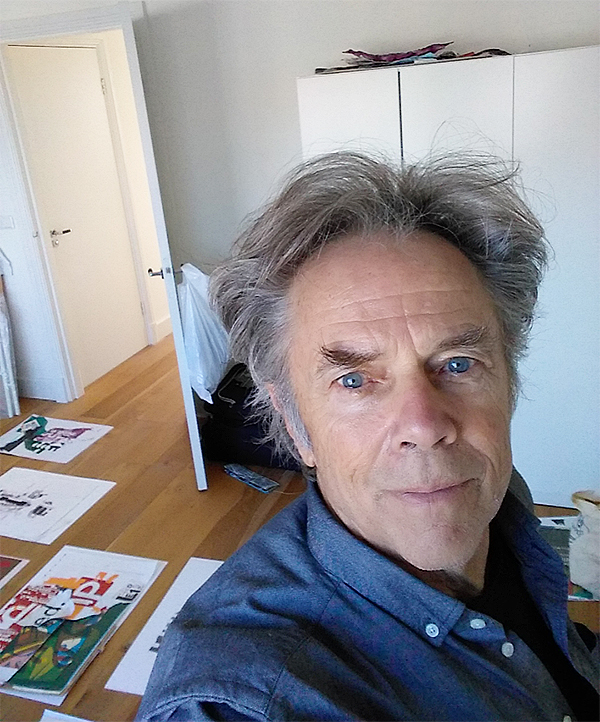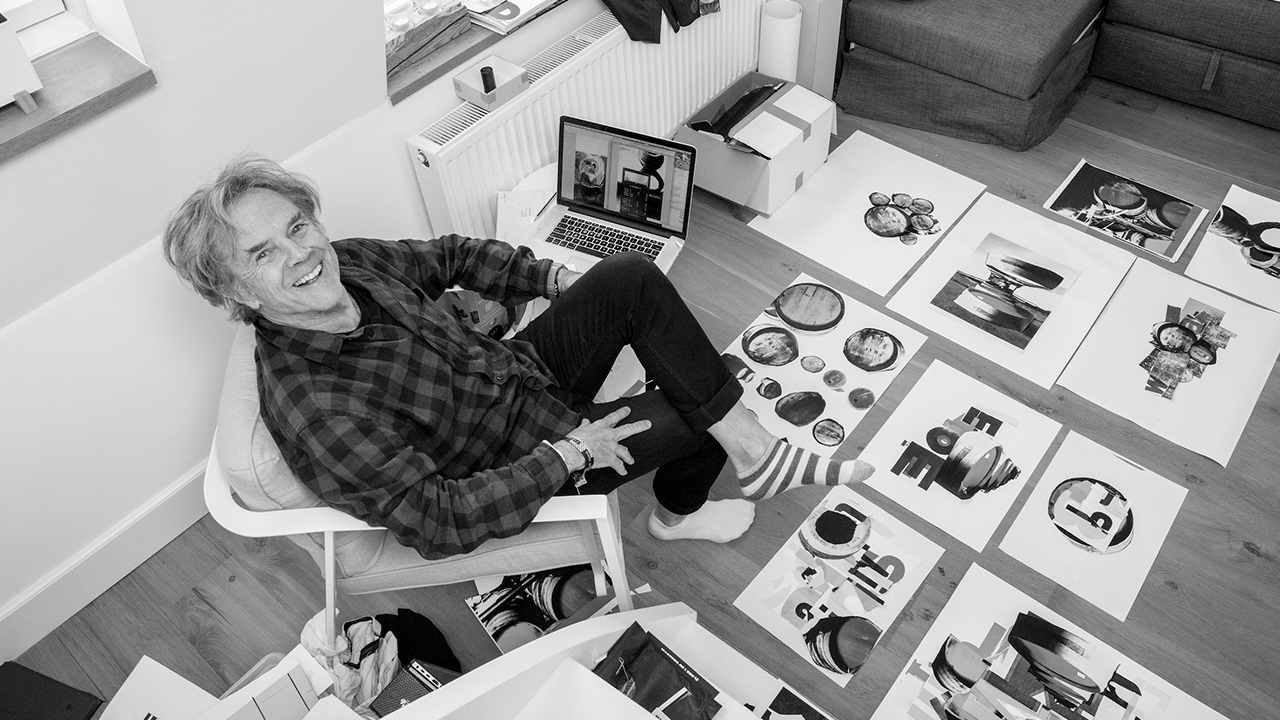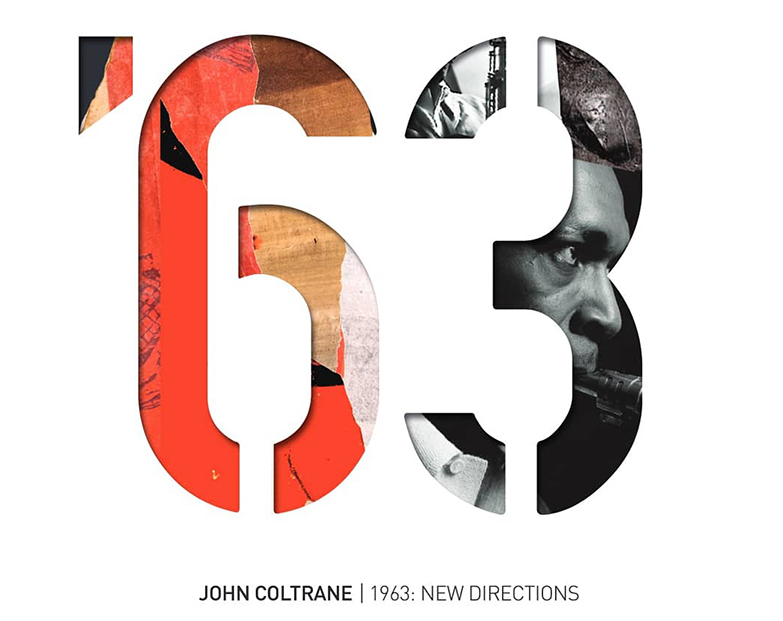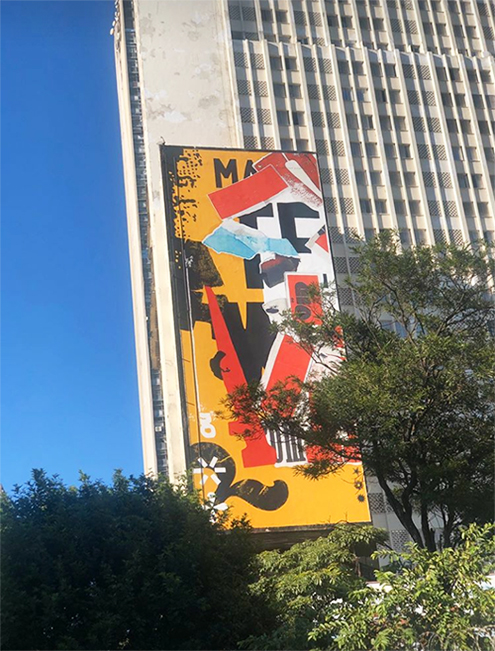Interview by Chief Editor
Polaris collective 2020
9 min read
David Carson is an American graphic designer, art director, and surfer. His innovative magazine design and experimental typography are known in mass media and the creative industry. He once served as the art director for the magazine Ray Gun and has consulted for many big brands such as Nike, Pepsi, and many others. His widely imitated aesthetic defined the grunge typography era. As one of the main features in our Grand Masters interview series, Carson discusses graphic design today, collaborations, and views on the world pandemic.
(VC) How do America’s present culture and its realities factor into your graphic work?
(David) Sometimes it can affect it in being a bit dark, even pessimistic. But I also do work that seems unrelated to all that’s going on. People were worried and upset in America 24/7 before the pandemic as a result of Trump. It seemed like being angry, dismayed, and repulsed by Trump was a full-time occupation for many people. Then, you add a pandemic and all the horror stories that go with it. that’s a lot of negative energy. Much of my future work is postponed or canceled, which gives me more time for personal projects. The collage work I’ve been doing is a pure form of design. No client, no deadline, or expectations. I am just arranging colors and shapes until I feel good about it. But I’m finding it hard to concentrate on work. Sometimes it feels less critical with all that’s going on other times it feels more important than ever, as a bit of an escape, to re-appreciate why one got into this field in the first place, that inner attraction to the process and the work itself. But overall I seem to spend less time on my work, I’m easily distracted. I can’t go very long in the day without checking in to see what awful news is breaking, who has the virus, what new idiot thing Trump has done. So it is an interesting situation where we have more time to devote to the work. Still, I don’t necessarily feel the luxury of spending unlimited time on it.
I was a speaker at an event where all the introductions, and follow up between presentations were done by Artificial Intelligence, some bizarre invisible speaker in the sky. It wasn’t perfect. At the end of the day, or even the beginning, we need the human touch, voice, and love
(VC) The general technical processes intertwined with graphic design has taken a huge leap in recent years into the space of AI (Artificial Intelligence) can anything good come out of this?
(David) Artificial Intelligence maybe people in retirement homes, rather than just waiting their turn for the covid19, can tour the world or go to places they never went, or regret not going. a friend that works in ai, tells me they now can make the virtual world feel as real as the actual world, you’ll see no difference between having the goggles on or off. he’s an extremely bright man, and he tells me this brings up the “obvious question” are we simply living in someones else’s virtual reality.? but I think I’m confusing VR and ai. AI has not been on my long list of things to worry about. there’s a news program here I happened onto by accident where news is read by some automated voice.. and it sounds like it. I find it very irritating. I’m sure there are other people who think ‘oh it sounds just like a human!’ and others don’t even question it. I was a speaker at an event where all the introductions, and follow up between presentations were done by ai, some invisible bizarre speaker in the sky. it was awful. at the end of the day, or even the beginning, we need the human touch. and voice. and love

Photo courtesy of David Carson
(VC) As a designer how has the Coronavirus (Covid-19) pandemic affected your engagement with life as it relates to your collaborations?
(David) I find it frustrating that you can’t tell if someone is smiling while wearing a mask, and they cant see if you are. I have a bit of a dry sense of humor, and people need to see I am smiling. It seems collaborations are less. Some just went away-they weren’t all magically transferred over to Zoom. But on a positive note, I’m hearing from people I haven’t heard from in years. So in some ways, the virus is bringing more engagement, from strangers or near-strangers to good friends, asking how are you doing? And that’s quite nice. I’ve also emailed people that I’ve meant too for a long time. I’m not inclined to want to “hang out” online with people I barely know. Still, I’m getting a lot of requests. Some jobs that had become daily conversations have stopped, as people deal with their new realities and day to day stuff. I find overall, its harder to concentrate. “Currently locked down in the Caribbean” is not a phrase known to attract sympathy. I saw an excellent term for what I’m doing in an article in the NYTimes, I’m living full time in “scenic limbo.” I’m also getting swamped with requests for free online workshops, or talks, or on posters. I started, as I usually do to say yes to everything, but now I’ve put most of that on hold. It just seems more difficult to concentrate on things, in general, these days of scenic limbo.
(VC) What makes David create the present work he does. Are you in any form spiritual or scientific driven like many artists for muses?
(David) I wish I knew. its nothing I have to force, which is maybe why some if it succeeds. It is one of life’s beautiful little mysteries, why do I get up and on my way to make a coffee stop and rearrange some bits on the floor till it feels right. I don’t know where that comes from, but it’s just what I do. It’s nice to see people around the world react positively to something I’ve posted. though this is never the driving force. The decision to post something comes after the piece is complete and not before, and all the likes in the world won’t help you at 3 am when you wake up and realize how messed up things are, and you cant go back to sleep.

Photo courtesy of David Carson
(VC) What can you candidly tell young aspiring designers about success and risk in the business of the arts?
(David) The obvious would be you won’t have any if you don’t take risks. But first, you must have the eye, that intuitive sense of good design, that comes from trusting yourself, listening to your intuition, putting some of your uniqueness into your work. Everyone can buy the same tools, apps, programs, but no one can put your upbringing, your parents your whole life experience into the work, only you can do that, and its the only thing to draw from to create original work, then its about persistence and timing. Choose a vocation that you don’t dread going to work or watching the clock. The whole idea of TGIF (Thank God It’s Friday) is so wrong, ‘I have this awful job’, and finally, my week is over. ‘It’s the same as ‘I hate Mondays’. Do something you can’t wait to get back to do! Choose something you would do even if money weren’t needed.

Graphic Design work by David Carson
The arts allow us to do this. It’s possible not to dread going to work to make a living and a life. You get to be creative and enjoy what your doing. I’ve often said I make my living from my hobby. The arts are one of the few areas that you can later in life be thrilled you pursued what you did, as opposed to looking back at 43 years of selling insurance, or shoes, or whatever, doing anything only for the money. You won’t be happy with that choice when it’s over. On their death beds, people don’t regret much of what they did in their lives, its always the thing they didn’t do they regret. It may not be your first, second, or even third job, but its a very worthwhile pursuit. Find that thing you would do even if you didn’t need the money.
Now I think this concept of experimenting in public has mostly disappeared. I would have enjoyed graphic design when it was more art, but all eras have plusses or minuses, enjoy the one you’re in. These are the good old days
(VC) Some mention different historical times as a period they admire for artistic affluence or culture If you can time-warp to any era to collaborate with its culture, what time would it be and why?
(David) No. maybe because I didn’t study them. My degree is in sociology. I have no formal design education, so I have never felt oh, I wish I could have been a designer then. I’m quite comfortable and happy with my era in design. Though lately, it’s gotten gentrified and conservative and devalued. Logos 29.95! Website 39.95! Etc, and now everyone’s a branding expert, though few understand the good design’s real communication power. I remember when things were starting to take off for me in the early 90s, and a well-known designer said to me, ‘wow, isn’t this a great time to be a designer? And I thought, well yeah, I guess so what other time is there? But he was right. It was a very experimental time, lots of exploration, and risk-taking. Someone once said I was experimenting in public, because you had your work printed, often in magazines, without any pre-testing, or even feedback, often for months. We had to trust our decisions and put them out there. Some of it worked. Some of it didn’t. Now I think this concept of experimenting in public has mostly disappeared. I would have enjoyed graphic design when it was more art, but all eras have plusses or minuses, enjoy the one you’re in. These are the good old days.
(VC) At this stage of your career considering your commitments and accomplishments, if you could collaborate with a specific artist, brand, or individual, who would it be and why?
(David) I have been fortunate to work with many of the world’s largest brands, from computers to cars, to airlines, hotels, and musicians. So any project that would allow me to grow, experiment, and push myself creatively. Have excellent visibility and hopefully have some good social impact, potential clients: I’m tan, fit and ready, email me!

Photo courtesy of David Carson
(VC) Is there anything you want the new breed of aesthetic consumers or decision markers to know about David Carson?
(David) That I trusted my gut and made the call to follow my heart in what I wanted to do. I stayed true to myself and was able to be successful. As the amazing motion and poster designer, Sal Bass told me, “keep doing what you do and don’t pay attention to all the distractors.”
It’s been said that Designers don’t retire they die
#davidcarson #visualcollaborative